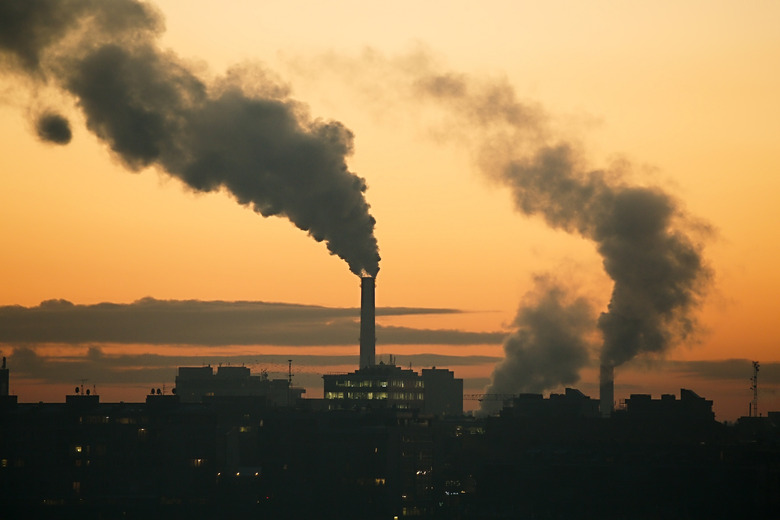Is CO2 Bad For The Planet?
Too much carbon dioxide in the atmosphere is not good for the planet or other living creatures. While CO2 is a natural result of life, and a vital part of the growth cycle of plants, too much of it in the atmospheric bubble that surrounds the Earth traps the heat from the sun, raising temperatures on Earth. If humanity cannot reduce its CO2 output, the planet faces an uncertain future.
TL;DR (Too Long; Didn't Read)
Carbon dioxide becomes a poisonous gas when there is too much of it in the air you breathe. Besides the effects it can have on the planet and the atmosphere, carbon dioxide poisoning can lead to central nervous system damage and respiratory deterioration in humans and other breathing creatures.
The Carbon Cycle
The Carbon Cycle
Under normal circumstances, CO2 is a natural part of the life cycle on Earth. Animals and humans exhale CO2, and plants absorb the gas and produce oxygen. Carbon passes between the air, land and sea as plants and animals live and die. In the past, this cycle remained balanced, with carbon outputs and carbon absorption running relatively even.
The Industrial Revolution changed that balance. Carbon dioxide produced by burning fossil fuels for heat, transportation and manufacturing upset this balance. An imbalanced carbon cycle threatens to alter climates and change land use and living habitats.
Fossil Fuels and CO2
Fossil Fuels and CO2
When living creatures and plants die, the carbon in their bodies returns to the Earth. Through millions of years, heat and pressure change this carbon residue of dead plants and animals into natural gas, coal and petroleum. Since the Industrial Revolution, humans have been releasing CO2 from these fuels more quickly than it can be re-absorbed naturally through the carbon cycle resulting in higher levels of CO2 in the atmosphere. According to the U.S. Environmental Protection Agency, the amount of CO2 in the atmosphere has gone up by 40 percent since 1750. As the amount of CO2 in the atmosphere increases, it can trigger significant changes in climate.
The Greenhouse Effect
The Greenhouse Effect
The major threat from increased CO2 is the greenhouse effect. As a greenhouse gas, excessive CO2 creates a cover that traps the sun's heat energy in the atmospheric bubble, warming the planet and the oceans. An increase in CO2 plays havoc with the Earth's climates by causing changes in weather patterns.
According to the EPA, humans release 30 billion tons of CO2 into the atmosphere every year. Because each CO2 molecule might last for up to 200 years, this carbon overload can have long-term consequences.
Other Side Effects
Other Side Effects
The increase in CO2 in the atmosphere has many side effects. Because plants absorb CO2 as part of their growth cycle, an increase in the gas can cause growth changes in plants. In a 2008 study by University of Illinois, scientists found that soybeans grown in a high-CO2 environment lost some of their natural defenses against pests. A study by Southwestern University suggests that increased CO2 reduces the protein content of many crops. In addition, high CO2 levels in the oceans can affect the growth of some marine life, making some species more vulnerable to predators.
Cite This Article
MLA
Kazmeyer, Milton. "Is CO2 Bad For The Planet?" sciencing.com, https://www.sciencing.com/co2-bad-planet-4876/. 19 April 2018.
APA
Kazmeyer, Milton. (2018, April 19). Is CO2 Bad For The Planet?. sciencing.com. Retrieved from https://www.sciencing.com/co2-bad-planet-4876/
Chicago
Kazmeyer, Milton. Is CO2 Bad For The Planet? last modified August 30, 2022. https://www.sciencing.com/co2-bad-planet-4876/
